Erasmus+ KA131 – period 2021-27
Erasmus+ KA131 – partner states of the EU
Erasmus+ will support transnational partnerships among Education, Training, and Youth institutions and organisations to foster cooperation and bridge the worlds of Education and work in order to tackle the skills gaps we are facing in Europe.
Short information:
Erasmus Charter for Higher Education 2021-2027
- Students can go abroad for 2 to 12 months (including a complementary traineeship period, if planned). The same student may receive grants forstudying or being trained abroad totalling up to 12 months maximum per each cycle of study: during the first study cycle (Bachelor or equivalent) including the short-cycle (EQF levels 5 and 6), during the second study cycle (Master or equivalent – EQF level 7) and during the third cycle as doctoral candidate (Doctoral level or EQF level 8);
- Students may be awarded an Erasmus+ EU grant to help cover the travel and subsistence costs incurred in connection with their study period abroad. Erasmus+ students – whether or not they receive an Erasmus+ EU grant – are exempted from paying fees for tuition, registration, examinations and access to laboratory and library facilities at the host institution. The payment of any national grant or loan to outgoing students should be maintained during the study period abroad;
- Erasmus+ brings together seven existing EU programmes in the fields of Education, Training, and Youth; it will for the first time provide support for Sport. As an integrated programme, Erasmus+ offers more opportunities for cooperation across the Education, Training, Youth,
Scholarship rates per month within project 2024 and 2025:
Third countries not associated to the Program, with exception of countries from regions 13 i 141 – 700 EUR
Group 1 – Austria, Belgium, Denmark, Finland, France, Germany, Ireland, Iceland, Italy, Liechtenstein, Luxembourg, the Netherlands, Norway, Sweden, countries not associated to the Program from regions 13 i 141 – 670 EUR
Group 2 – Cyprus, Czech Republic, Estonia, Spain, Greece, Latvia, Malta, Portugal, Slovakia, Slovenia – 670 EUR
Group 3 – Bulgaria, Croatia, Lithuania, Romania, Turkey, Hungary, Serbia, North Macedonia – 600 EUR
1Region 13: Andorra, Monaco, San Marino, Vatican; region 14: Switzerland, UK, Faroe Islands
Students meeting the criteria included in the definition of ‘people with fewer opportunities’ will receive an additional €250 for each month of stay.
Travel support
Erasmus+ KA 131 programme offers a travel support for all participants:
- In the 2024 project: green travel flat rate or standard travel flat rate. Green Travel funding will apply to those going on exchange using low-carbon modes of transport (train, bus or car sharing) – declaration form. For journeys of up to 499 km, the use of low-carbon modes of transport is recommended by the European Commission. Students using high-carbon means of transport (e.g. aeroplane) will receive a one-off grant at the applicable rates – standard travel flat rate.
- In the 2025 project, the funding rules for the standard travel flat rate remain the same as in the 2024 project. The changes apply only to the green travel flat rate, and a new declaration form must be submitted.
Travel costs will be paid in a single flat rate according to the table attached below
| Distance | GREEN TRAVEL flat rate | Standart travel flat rate |
| from 10 to 99 km | 56 € per participant | 28 € per participant |
| from 100 to 499 km | 285 € per participant | 211 € per participant |
| from 500 to 1999 km | 417 € per participant | 309 € per participant |
| from 2000 to 2999 km | 535 € per participant | 395 € per participant |
| from 3000 to 3999 km | 785 € per participant | 580 € per participant |
| from 4000 to 7999 km | 1188 € per participant | 1188€ per participant |
| 8000 km or more | 1735 € per participant | 1735 € per participant |
- Erasmus Policy Statement 2021-2027
- Erasmus Charter 2014 – 2020
- Erasmus Policy Statement 2014 – 2020
- Erasmus Policy Statement 2007- 2013
Complaints and requests procedure
All complaints, comments, requests, or problems should first be reported by email or in person to the respective coordinators of student/staff departures and arrivals. If the issue can be resolved by the relevant employee, it is resolved at the level of the administration of the units dealing with outgoing and incoming students/staff. In other cases, students/staff submit complaints/requests to the Erasmus+ Program Coordinator or the Vice-Rector for Cooperation and Projects. In addition, the university has a Student Rights Ombudsman within the Student Parliament and an Equal Treatment Officer within the Rector’s Committee.

Agnieszka Nowak
Head of IPO, Erasmus+ Coordinator
phone: +48 (12) 293 54 56
room 2.3

Anna Lisiecka
Contact person for: recruitment for exchange programs.
phone: +48 (12) 293 54 83
room 2.1
duty hours: Tuesday 11 a.m to 1.00 p.m

Justyna Mentel
Contact person for: outgoing students – Belgium, Bulgaria, France, Germany, Hungary, Italy, Slovakia.
phone: +48 (12) 293 55 52
room 1.2
duty hours: Monday and Thursday 11 a.m to 1 p.m

Katarzyna Zimny
Contact person for outgoing students: Austria, Cyprus, Czech Republic, Denmark, Estonia, Finland, Greece, Latvia, Lithuania, Island, the Netherlands, Norway, Romania, Spain, Switzerland, Turkey.
phone: +48 (12) 293 52 94
room 1.1
duty hours: Monday and Thursdays from 1 p.m to 3 p.m

Łukasz Smug
Contact person for: logistical support for BIP program, contact for Erasmus+ student mobilities: Malta, Portugal, Slovenia, Liechtenstein, CEEPUS student mobilities, logistics of foreign guest visits.
phone: +48 (12) 293 54 86
room 1.5
duty hours: Tuesday – Friday from 11:00 am to 2:00 pm and by e-mail/phone appointment
